National search for election technology backed by Comelec
The Commission on Elections (Comelec) this week accepted as a sponsor of the 4th National Search for Product Excellence in IT (automated elections) initiated by the Automated Election System Watch (AES Watch) and other organizers of the first FIT4E Conference.
Comelec Chairman Sixto S. Brillantes, Jr. made the announcement at the launching of the national search which highlighted the first Filipino IT for Automated Elections (FIT4E) Conference on June 13, GT Toyota Asian Cultural Center, University of the Philippines, Diliman, Quezon City.
Brillantes, who replaced former Justice Jose Melo to head the Comelec, said the Commission "will definitely accept its role as one of the sponsors" of the national search. He added that the Comelec en banc will meet to decide in what form it will sponsor "the search for the real Filipino election technology."
In the 2013 elections the poll agency will closely coordinate with the Filipino IT sector with which the previous Comelec "did not appear to have good relationship," he said.
With Brillantes were Comelec Commissioners Augusto "Gus" Lagman, Rene Sarmiento, and Christopher Go-Lim. They were joined by Rep. Neri Colmenares (Bayan Muna) and Tim Orbos who represented the Office of the Executive Secretary.
The FIT4E Conference was attended by about 200 IT practitioners and academics, policy think tanks, researchers and scientists, as well as citizens' election watchdogs and other organizations. Evi-ta L. Jimenez, Executive Director of the Center for People Empowerment in Governance (CenPEG), acted as the conference coordinator.
In his keynote address, UP President Alfredo E. Pascual pledged the university's support to the national search adding that election technology can be developed by Filipino IT practitioners and programmers. The country's election process and sovereignty must not by outsourced to a foreign provider. The Philippines' first automated elections in May 2010 used the election technology provided by the multinational company Smartmatic which was found by the Center for People Empowerment in Governance (CenPEG), AES Watch, and other groups as being fraught with critical problems.
Highlight of the one-day event was the video conferencing with U.S.-based computer security experts David A. Wagner, PhD, of the University of California-Berkeley, and Douglas W. Jones, PhD, of the University of Iowa. Wagner led a UC IT team that found serious errors in California's electronic election prompting the state to enact a law requiring providers to reveal their source codes for independent review during the bidding. Jones was the technical advisor of the acclaimed film, "Hacking Democracy," that exposed electronic fraud in the U.S. presidential elections of 2000 and 2004.
Presenting their papers were Angel S. Averia, a security programmer from PhiCERT and IT consultant of CenPEG; Susan Pancho-Festin, professor and computer security expert from UP's Department of Computer Science; Felix Muga II, Ateneo mathematics professor and senior fellow, CenPEG; William T. Torres, professor from the Mapua Institute of Technology and president/co-founder, Moscom internet; Maria Corazon Akol, president of Philippine National IT Standards (PhilNITS) Foundation; Pablo Manalastas, computer science faculty of Ateneo and UP and IT consultant, CenPEG; Nelson J. Celis, chair, PCS Foundation and AES Watch chair of the national search for IT excellence in automated elections; Rick Bahague, Jr., national coordinator, Computer Professionals' Union (CPU); and lawyer Felix Carao, Jr., partner, Saguisag Carao & Associates and volunteer lawyer for democratic governance advocacy.
Providing the synopsis of various studies on the AES and overall synthesis was Bobby M. Tuazon, CenPEG Director for Policy Studies.
Conference proper was opened by Jaime D. L. Caro, chair of FIT4E Secretariat and Director of the UP IT Training Center (ITTC).
Aside from Jones and Wagner, conference reactors by video streaming were Gregg Gabison, PhD, Dean, College of Computer Studies, University of San Jose Recoletos, Cebu City; Dave Marcial, PhD, Dean, College of Computer Studies, Silliman University, Dumaguete City; and Magno Edilberto R. Conag III, College of Computer Studies, Ateneo de Naga University.
Poster presentations came from the Computer Security Group, UP DCS; Danny F. Wuyang and Henry N. Adorna, PhD, DCS faculty who also chaired the committee on papers; Waldemar A. Bautista, Halalan/UP Linux Users' Group (UnPLUG); and TransparentElections.org.ph.
Conference moderators were Prof. Allan Borra, DLSU-CCS, and Prof. Allan Sioson, Dean of CCS, Ateneo de Naga. Closing remarks were made by Rachel Roxas, PhD, Dean, DLSU CCS.
The conference secretariat from ITTC also included Carol Isabelle Lopez, Paulo Paje, Lemuel Brana, Jose L. Luzon, Bam Chua, and others. DZUP provided full coverage while the world-acclaimed UP Singing Ambassadors led by Ed Manguiat performed the invocation song and national anthem.
The conference was organized by AES Watch, UP-ITTC, Computing Society of the Philippines (CSP), Philippine Computer Society (PCS), National Citizens Movement for Free Elections (Namfrel), PhilNITS, Concerned Citizens Movement (CCM), DLSU CCS, and CenPEG. FIT4E News
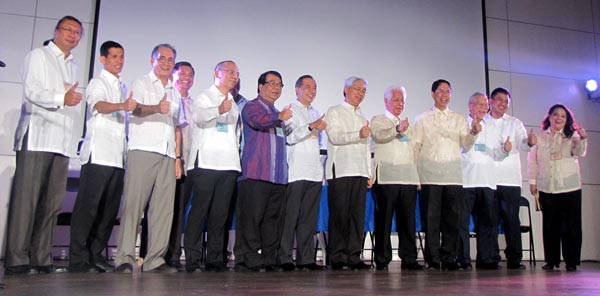
THUMBS UP for the national search (L-R): Toti Casino, PCS; Eric Alvia, Namfrel; Bobby Tuazon, CenPEG; Allan Sioson, President, Computing Society of the Philippines (CSP); Commissioner Christopher Go-Lim; Rep. Neri Colmenares, Vice Chair, House Committee on Suffrage and Electoral Reform; Nelson Celis, PCS Foundation; UP President Alfredo E. Pascual; Comelec Chair Sixto S. Brillantes, Jr.; Commissioner Rene Sarmiento; Commissioner Gus Lagman; Tim Orbos, Office of the Executive Secretary; and Maricor Akol,PhilNITS.
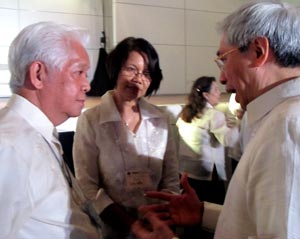
IN A HUDDLE (L-R): Comelec Chairman Brillantes, Evi-ta L. Jimenez, and UP President Pascual

Evi-ta L. Jimenez, CenPEG's executive director, presents conference objectives
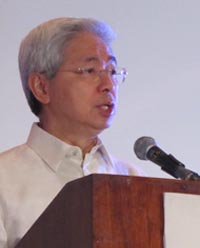
UP President Alfredo E. Pascual, keynote speaker
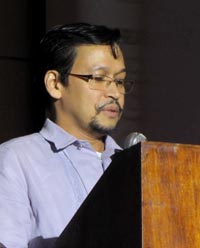
Jimmy D. L. Caro, UP-ITTC director, reads the conference resolution

Rachel Roxas, Dean, DLSU's College of Computer Studies, gives the closing remarks

Video conference with Douglas W. Jones from University of Iowa
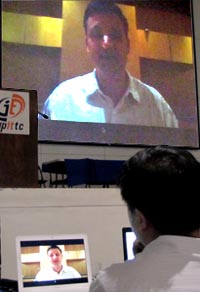
Video conference with David A. Wagner, UC-Berkeley

World-acclaimed UP Singing Ambassadors with founder-conductor Ed Manguiat
- Probing presidential platforms
- Conference calls for people-centered policy actions for Asian development and peace
- WWII 'comfort women' urge visiting Japanese emperor: OFFICIAL GOV’T APOLOGY, UPHOLD TRUTH, and JUST COMPENSATION
- FEARLESS FORECAST (EPISODE II): Comelec will not comply with e-Commerce Law in 2016 elections
- Fearless forecast: Comelec’s non-compliance with the AES law in 2016 (last of 2 parts)
- Fearless forecast: Comelec will not comply with the AES law in 2016
- CenPEG releases travelogue
- Experts: Nuisance bets reflect disillusionment, uneven playing field
- Partylist solon presses for tax cuts
- The True Cost of a Political Campaign
- Management decisions: Based on RA 9369 or purely Comelec’s?
- CenPEG holds 1st roundtable with media on presidential poll results
- Filipino IT can do it!
- FIT4E: The only transparent solution
- Realpolitik in the maritime tiff
- China’s challenge to PH sovereignty
- Choosing the next president
- Fixing the presidency, reforming the state
- New Comelec chair says he’s open to other election technologies
- SC ruling on AES Watch Pabillo and IBP vs Comelec, Smartmatic-TIM
- Comelec must explain P3.2B unliquidated cash advances
- CONGRESS ASKED TO HOLD DEMO ON PCOS HACKING
- 25 Bishops ask poll body to stop midnight deal with Smartmatic
- Pope Francis: reform and conversion
- 2 poll watch coalitions stage rally vs Comelec-Smartmatic midnight deal
- AES Watch questions Comelec-Smartmatic midnight deal
- ASEAN-India: Building Youth Partnerships through Culture and Entrepreneurship
- CenPEG forges research exchange and partnership with Jinan University
- FOI: Bearing fruit or foiled again?
- Remittance with Representation: The right to vote of overseas Filipinos
Center for People Empowewrment in Governance (CenPEG), Philippines. All rights reserved


